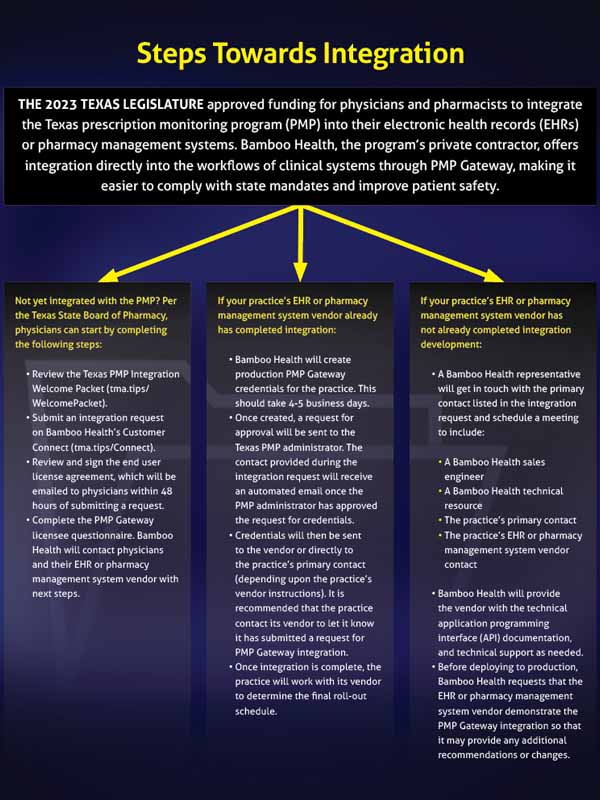Austin internist and Texas Medical Association Board of Trustees member Tony Aventa, MD, was shocked when the 2021 Texas Legislature rescinded state funding for integration of the Texas prescription monitoring program (PMP) into electronic health records (EHRs) and pharmacy management systems.
The move amounted to yet another unfunded mandate physicians had to grapple with after the 2019 Texas Legislature required that physicians check the PMP before prescribing opioids, benzodiazepines, barbiturates, or carisoprodol.
“It was certainly a burden for [practices that] couldn’t integrate without state funding,” he said. “Funding from the state is imperative to ensure proper use of the system and effective patient care.”
Managed by the Texas State Board of Pharmacy, the PMP collects and monitors outpatient prescription data and patient prescription history for all Schedule II, III, IV, and V controlled substances.
Originally, state funding covered the cost of integrated PMP access through the private contractor Bamboo Health, formerly Appriss. But on Sept. 1, 2021, the state ceased integration coverage, affecting the 65% of Texas physicians that TMA’s 2023 Health Information Technology survey found use EHR systems to access the PMP.
With state funding no longer available, Bamboo Health invoiced physician practices for the annual licensing fee to access the PMP through their EHR, a move that affected both physicians and patients.
“PMP integration makes a huge difference in how much time it takes to effectively take care of patients,” Dr. Aventa said. “And it enables physicians and other health professionals to easily and closely monitor patients’ prescriptions, a feature that directly aids physicians in avoiding potential drug abuse.”
Responding to a collective outcry from its members, TMA petitioned the 2023 Texas Legislature to overturn the removal of state funding, arguing that the lack of EHR integration created additional administrative burden, especially for physicians who treat patients at risk of overdose or adverse side effects.
“The move away from state funding not only increased costs; it also increased the amount of time those without integration spent in front of their screens instead of with patients,” said Michelle Romero, TMA associate vice president of legislative affairs.
As a result of that advocacy, all Texas medical professionals – pharmacists, project managers, physicians, and those to whom doctors delegate medical activities such as nurse practitioners, registered nurses, and physician assistants – again have free access to Bamboo Health’s PMP Gateway and NarxCare, a scoring tool.
“State funding is a win for Texas physicians and a win for Texas patients,” Dr. Aventa said.
Challenges to compliance
To comply with the 2019 mandate, physicians must document in a patient’s medical record that, before prescribing the specified medications, they checked the PMP for the patient’s prescription history and information that indicates any illicit activity, drug abuse, drug diversion, or doctor shopping. Although practices can access the PMP without EHR integration, doing so requires physicians to separately navigate the state’s prescription monitoring web portal to check patients’ prescribing history.
“I look at patient history to understand the concern for a significant interaction, side effect, or a possible overdose,” Dr. Aventa said. “Imagine trying to monitor your patient’s prescription history across multiple interfaces.” Without state funding, “it’s possible that some physicians or pharmacists wouldn’t do it as often as they should, simply because of the challenges of getting onto that system.”
Nor was compliance guidance provided by the pharmacy board easily accessible, forcing physicians to either pay to incorporate that information so it would show up at the time they pulled up a patient EHR, or spend time away from patient care searching for it.
Failing to comply with the state mandate – even due to a common error – means possible remedial or disciplinary action by the Texas Medical Board.

Cost hurdle removed
Now, as of Sept. 1, the pharmacy board offers statewide integration of the PMP and NarxCare into EHRs and pharmacy management systems.
Partnering with Bamboo Health, the board provides integration to medical professionals using PMP Gateway, a multistate query system that provides access to most state PMPs. PMP Gateway enables:
- Care coordination through information transfer of multistate PMP data, allowing physicians and pharmacists to access patient prescription history with improved transparency;
- Integration compatible with more than 500 clinical systems, including all major EHR vendors; and
- Support in selecting an EHR system that aligns with each practice’s goals.
Also, as of September, Bamboo Health has discontinued invoicing practices that previously paid the $50 licensing fee for software integration of Texas PMP Gateway and NarxCare. NarxCare is available within the state’s PMP web portal and integrated EHRs, pharmacy management systems, and e-prescribing tools. Previously, NarxCare integration cost practices an additional $250 per physician, per year.
Not only will practices save money but also, per Bamboo Health, integration will save 4.2 minutes per patient encounter and support medical professionals in meeting mandate requirements.
For Dr. Aventa, that adds up to more time with patients, less time poring over prescription data across multiple platforms, and improved patient safety.
“The importance of electronic health record integration just can’t be overstated,” Dr. Aventa said. “Before the state provided free integration, physicians had to pay to simplify their workflow. Now, physicians can oversee patient care effectively without burdensome costs.”